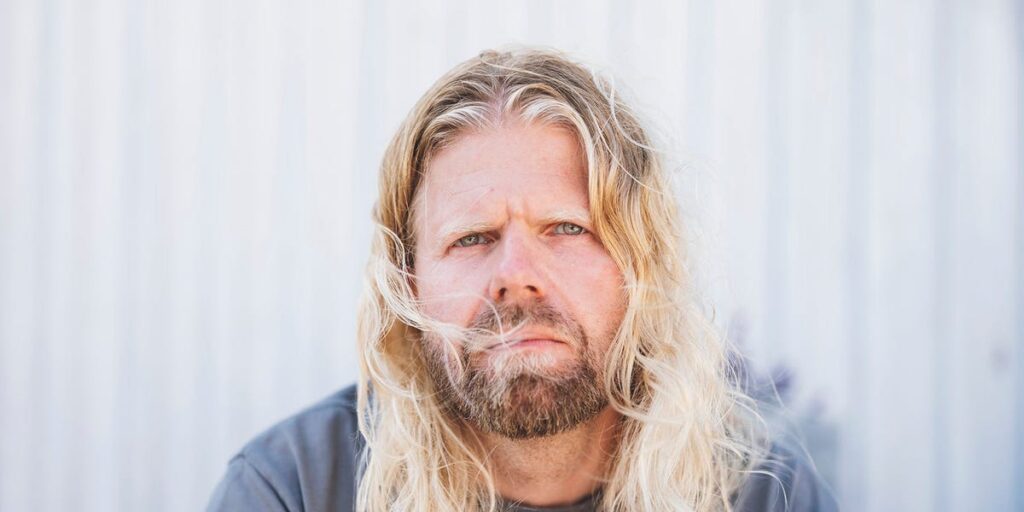Everything was on track when it came to Jón Óskar Árnason’s culinary career — until it wasn’t.
Born and raised in Iceland, Árnason partnered with his then-wife Sarah to open a bistro named Bryggargartan in her Swedish hometown in 2004. Five years later, they relocated to Skellefteå, a town 480 miles north of Stockholm with a population of under 80,000 people.
Skellefteå, part of Swedish Lapland, has become known as the “kitchen pantry” of Scandinavia following the New Nordic culinary movement. It’s where many Michelin-star chefs forage, hunt, and catch their own ingredients — including grouse, arctic char, and cloudberries — for their restaurants. Árnason is one of those chefs.
“Our focus was on bringing top-level gastronomy to a region that had been in a gastronomical standstill for decades,” Árnason told Business Insider.
Árnason said he had always felt in control of his career, but when the pandemic hit, he found himself at a crossroads. After almost twenty years of marriage, he and his wife were going through a divorce, and his daughter Judith had moved out — she was starting a career as a sommelier. Árnason found himself wanting more.
His divorce led to a new hobby
Árnason, now 46, had considered selling the restaurant, but when the pandemic hit, he said no buyers were interested in buying it, so he has continued running it with his ex-wife.
But he still wanted to find another channel for his creativity.
He found inspiration four years ago while sitting in his seaside house overlooking the Baltic Sea. He wanted to know what the nature around him would taste like when distilled with alcohol.
“The hours of sunshine and the northern climate must affect the taste, I thought to myself,” said Árnason. “Surely, our Swedish water can make an exceptional gin that can be served neat and not always as a cocktail.”
Rather than using dried juniper, cloves, and peppercorns sourced from Asia to make a typical London Dry, Árnason started handpicking his own berries, herbs, and roots like fallow deer and cloudberries — ingredients that flower and are in full bloom in Swedish Lapland, depending on the season.
Árnason said he doesn’t dry his ingredients out — he puts them in fresh, making the spirit drinkable both straight and with a mixer. In contrast, popular gin brands like Hendricks and Tanqueray use dry botanicals or essences to achieve their flavors.
“I want to work with what nature gives me and create something so clean it can be enjoyed neat,” Árnason says.
A new hobby led to a new career
After converting Judith’s bedroom into a makeshift distillery, production slowly became more than a hobby. It became a business.
This is what eventually led to the start of Ógin, which means “not a gin,” in Icelandic.
Árnason teamed up with creative director and designer Jakob Nylund. “Together, we mapped out the plan to make Ógin a high-end spirit company focused on products for the best restaurants in the world,” he said.
Árnason financed his first prototype through funds from pre-paid orders. He reached out to people who he had met during his years as a chef. “A lot of the early investment was my own money and time. I also managed to claim a small amount from an agricultural fund financed by the European Union, but to be honest, the biggest investment has been the time spent by both Jakob and myself,” he said.
“We also had support from my bank very early on in the project, which surprisingly believed in us,” he said. Árnason did not share the bank loan details with BI.
It was two years later, when the Swedish investor Konrad Bergström joined, that they gained more financial freedom. “A guest of my restaurant turned friend, joined us as a partner — this made us more economically sustainable,” Árnason said. Bergström is a Swedish serial entrepreneur, perhaps best known for starting X Shore, a company that claims to be the “Tesla of the Seas.’
Today, the bottles of Ógin listed on the brand’s website range in price from 751 to 1,688 Swedish Kronasells, or $74 to $165.
Árnason is not the first chef to dabble in the spirits world. Chefs behind Michelin-starred restaurants like Michael Roux Junior and Alex Dilling, along with celebrity TV presenter Guy Fieri, have also launched their own spirits.
The global gin market has been on the rise and is projected to increase by $7.36 billion between 2023 and 2028, according to Technavio, a market research company.
Dividing the passion
At the beginning of his project, the chef bottled 70 liters of gin. Now, he produces approximately 10,000 liters per season and makes both gin and vodka. All his clients are Michelin-starred restaurants, and that’s how he intends to keep it.
“I’m not going to sell to every restaurant or to the supermarkets in Europe,” he said, adding that he wants to open the client base up to high-end hotels and top bars.
The chef still runs the restaurant with his ex-wife, splitting his time between that and his new company. The workload for the brand varies depending on the season.
Árnason says they’ve achieved profitability but declined to provide specifics. “It’s still small, and it will probably be a few years before I make more from Ógin than from Bryggargatan,” he said.
While Ógin is growing, Árnason says he’s not in a hurry: “This is about building a brand that stands for the highest quality and no compromises.”
Read the full article here


